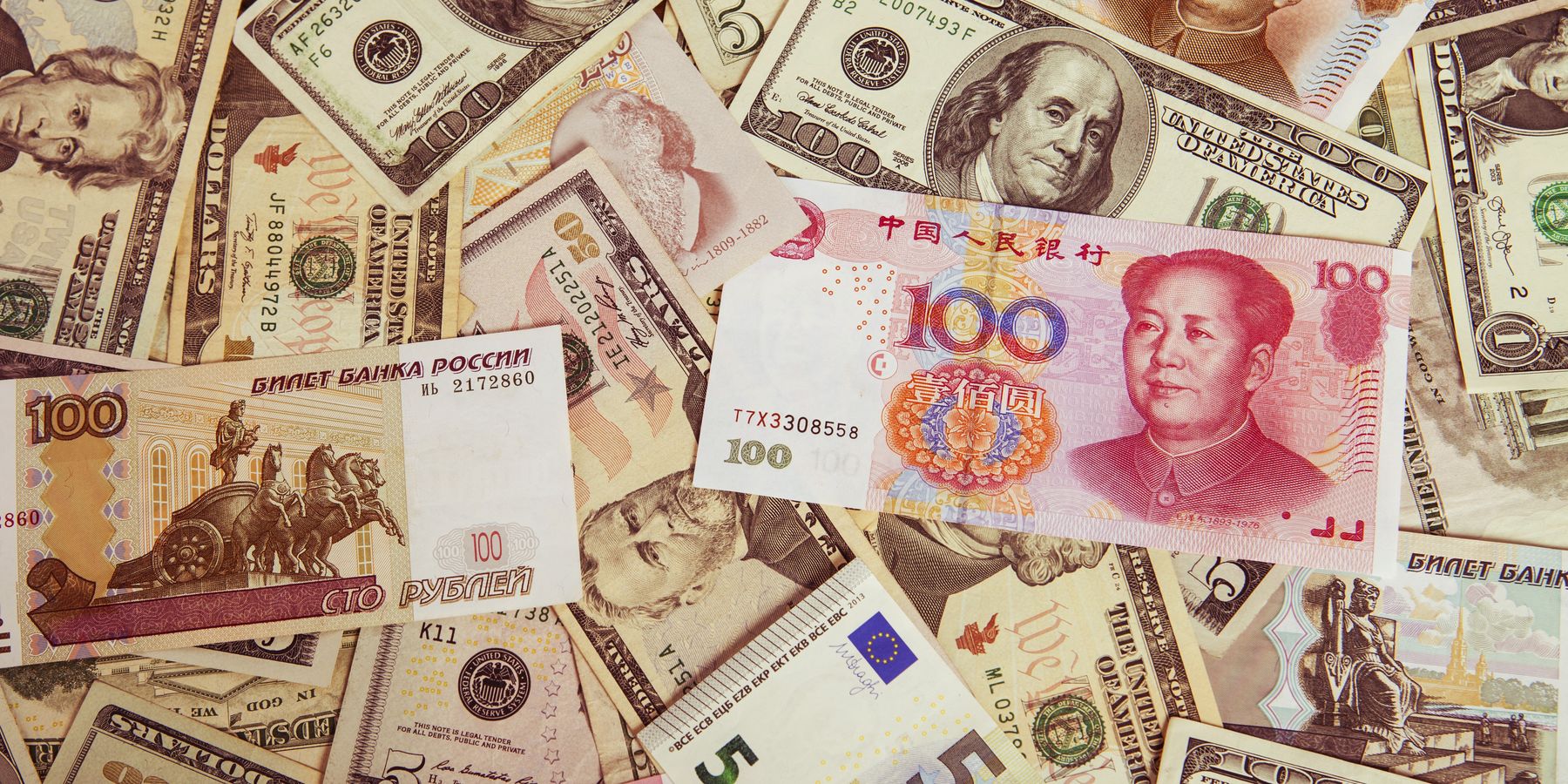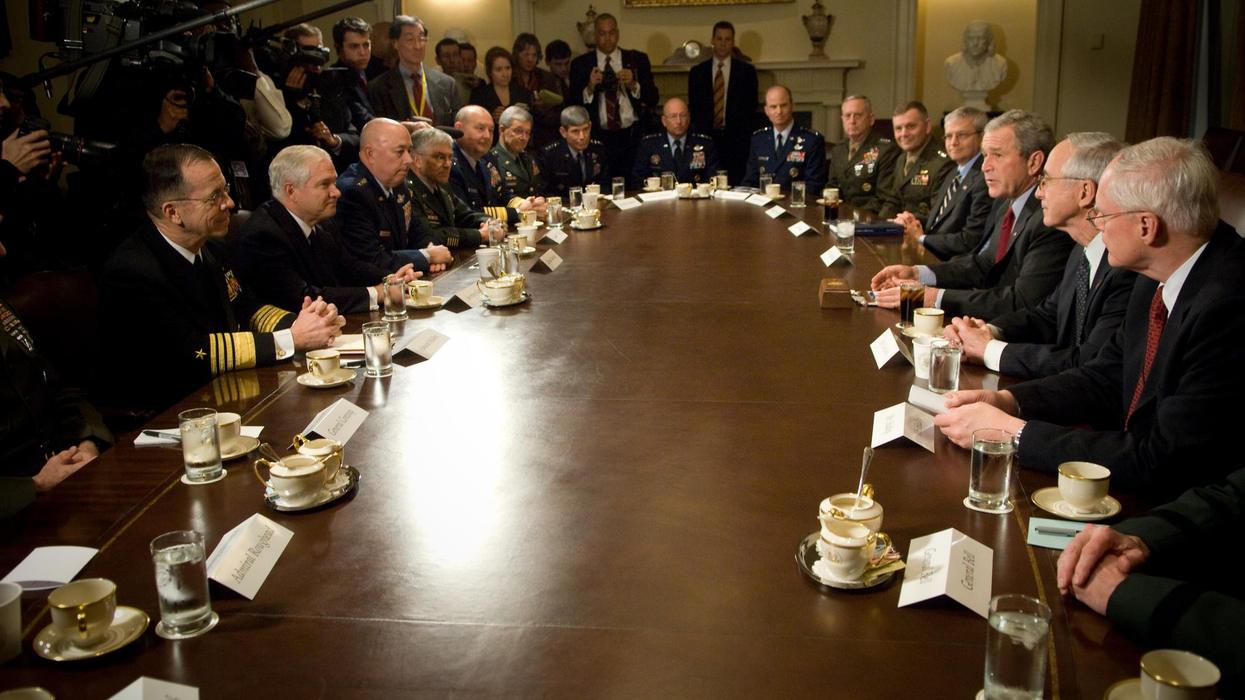If there is a "Chekhov's gun" in the ongoing Russia-Ukraine conflict, it consists of circa $300 billion worth of central bank assets sitting in the coffers of the U.S. and (more so) its close allies.
Frozen at the outset of Moscow's invasion, the money represents both the object of the strongest sanctions taken so far against a state outside of a UN-authorized regime, and, at the same time, the possible target for even more dramatic further escalatory measures.
The question at the moment is whether G7 states will make the crucial transition from "freezing" to "seizing" – i.e., liquidate the funds and then reallocate them to assist Ukraine. The issue has gathered urgency amidst flagging support in the U.S. and in Europe for continuing to expend funds on shoring up Ukraine's struggling defenses.
At home in the U.S., the bipartisan REPO Act endorsed by the Senate Foreign Relations Committee would empower the President to "confiscate ... Russian sovereign assets'' and to then deposit them into a "Ukraine Support Fund" that would aid in reconstruction, recovery, and the "welfare of the Ukrainian people." Those goals, if vague, are hardly objectionable. But using seized sovereign assets to promote them is, as a matter of law, untested and problematic.
As a matter of economic statecraft, meanwhile, it is still more inadvisable, for several reasons. These include the significant risk of alienating allies, further discrediting U.S. "dollar power", boosting China's prestige and its own "yuanization" aims, and endangering U.S. assets abroad.
Piercing the Veil of Sovereignty
The legal objections are quite simple to summarize. The norm of sovereign immunity is one of the most well-established customs in international law. In the eyes of many experts, it is precisely the firmness of this bedrock principle that has allowed exceptions, such as litigation for commercial disputes involving states, to become reliable.
The rule is reflected in the law of countries around the world, including in the U.S.'s own Foreign Sovereign Immunities Act. China, notably, has only as of this year finally implemented legislation for immunity that clearly separates commerce from matters of state, putting foreign businesses and investors on equal footing as litigants — which should be seen as a victory for U.S. interests in its market.
Despite immunity's inarguable applicability to central banks, advocates of asset seizure have pointed to the custom of "countermeasures'' to justify their project. These are illegal acts taken by states injured by a previous wrong of another state, and intended only to induce the latter to cease its misbehavior. Usually, only a directly injured party (here, Ukraine) can take such actions, but emerging arguments for "collective countermeasures"would extend the field of retaliators for some core wrongs to include any state in the global community.
Experts critical of asset seizure have pointed out, however, that doctrinal support is lacking. As Vanderbilt Law School's Ingrid (Wuerth) Brunk rightly summarizes: "There is little or no state practice on countermeasures for reparations ... There is little practice of third-party countermeasures, little or no practice of countermeasures used to deny immunity, and no practice that provides clear support for denying central bank immunity as a countermeasure."
Meanwhile, given that most of the funds currently lie in special accounts at the financial services company Euroclear, any repercussions would also be primarily borne not by Washington, but rather by its European allies. That fact has prompted considerable opposition to the initiative among European policymakers, despite their willingness to join earlier rounds of sanctions. After all, Europe's leaders are, in effect, being deputized to carry out a policy of financial warfare whose costs they will have to bear right along with that policy's targets.
First of all, the precedent of a geopolitically-motivated confiscation could threaten the euro's hard-won status as the world's second reserve currency. The euro’s attractiveness has been based on numerous ingredients, obviously including Europe's economic productivity, stability, and growth potential; however, its apparent security for asset-holders as compared with the more thoroughly weaponized U.S. financial system is also a key factor. And then there is, of course, European states' relatively far greater vulnerability than Washington in the case of any escalations of the broader NATO-Russia conflict.
It is understandable why the EU has so far balked on agreement to a plan of outright confiscation of Russian funds. It has, instead, begun to implement a much more moderate approach of reallocating to Kyiv the sizable interest payments being generated by the frozen assets. However, the G7 is still due to discuss the proposal for seizure at its next meeting. The Biden administration, along with Canada and Japan, remain strong backers of this idea.
A Financial Coalition of the Willing?
Debates are intensifying. For example, when Swiss lawmakers discussed reparations involvement this month, the motions were adopted in the Senate by 21 votes to 19, with three abstentions. Some senators worried about "weakening" international law protections, which "exist to protect small states." Those misgivings are still more widely shared beyond Europe, of course, as large swathes of the Global South know precisely how vulnerable they can already be to Western sanctions. A dubious new practice of asset confiscation would make U.S. dollar power, already a subject of widespread discontent, even more unpalatable.
If the G7 financial offensive provokes as much backlash as it seems poised to, could China stand to benefit? Certainly, Beijing is likely to reap diplomatic dividends from perceptions that Western financial warfare has become too extreme. Xi Jinping's Party center has emphasized portraying China as a law-abiding global power, especially by embracing UN institutions (where it, of course, exerts great influence at little cost). The contrast with a G7 maneuvering around the UN at every turn makes a potent impression in the Global South.
A separate question is whether China's vision of a "de-dollarized" world could receive a boost from Western confiscation efforts. Certainly, Beijing has long sought to increase the yuan's share of global foreign currency reserves and cross-border usage, and has made some recent progress. The RMB would indeed become more attractive as dollar and euro accounts began to look ever more vulnerable to seizure.
But it has a long way to go. Currently, the yuan is only the fifth global reserve currency, still narrowly trailing the yen and the pound. It is also limited by domestic economic issues and, especially China's strict capital controls and heavily managed exchange rates. As a recent article produced for a PRC Ministry of Education research project phrased it, given all of the current obstacles to international use of the RMB, even for Russia itself, "de-dollarization cannot be a complete renminbization."
Still, intensified weaponization of Western currencies could indeed boost China's yuan efforts, and, more significantly, provide a major stimulus to plans for a BRICS basket reserve currency. The move would simultaneously improve Beijing's reputation as an apparently more responsible actor with respect to foreign assets, while also perversely incentivizing it to further experiment with its own nascent unilateral sanctions regime.
A managed process of de-dollarization with cross-bloc participation could be a good thing, but a chaotic transition triggered by Western hubris, provoking similar ventures by great power rivals, would not be. Like the "coalition of the willing" that supported the illegal Iraq War in 2003, arguably helping to normalize behaviors like those of Russia today, the coalition now aligning for ever-escalating financial warfare may ultimately weaken international law protections for everyone, not only their intended targets. It is time to put a freeze on the transition to seizure.
- Biden officials want Russian frozen assets to fund Ukraine war ›
- Seizing Russian assets: A feel good bill that will absolutely boomerang ›
- Russian asset seizure scheme will prolong war | Responsible Statecraft ›

















